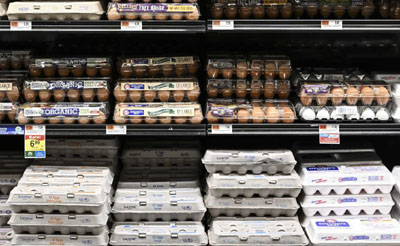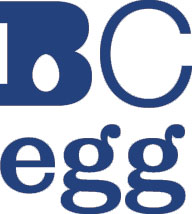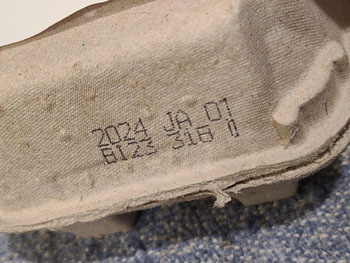Thursday December 7, 2023 | LANGFORD, BC [Updated December 13, 2023]
by Mary P Brooke, B.Sc. | Island Social Trends
Consumers are continuing to notice changes in the retail grocery shopping experience.
Under the ongoing food price inflation of the past 20+ months, prices are:
- frequently higher on a continuing basis,
- package sizes might be smaller (for the same price),
- out-of-season produce is exceptionally high priced in many cases, and
- some items will entirely out of stock (for short or longer periods).
Disruptions to what used to be a relatively seamless grocery shopping experience include supply chain interruptions or aberrations — often related to shipping and/or staffing challenges.
Staff disruption results in old eggs for sale:
Here’s one recent local case this week on Vancouver Island, where one store’s staffing disruption saw many cartons of eggs still for sale on the retail shelf. The cartons showed a best-before date stamp that indicated the eggs were at least three days beyond their best-before date.
Island Social Trends inquired with the local store manager. It seems that a key staff person in the dairy section was away sick for two weeks. Meanwhile, old stock was either found in the back and put onto the shelf or just remained on the shelf longer than recommended.
Customer returns were being accepted, if customers did notice and returned to the store with the old eggs (and receipt) for a refund.
Consumers can bring concerns to the attention of the retailer, or they can report a concern to the Canadian Food Inspection Agency if they think a product does not meet regulatory requirements.
Input from BC Egg:
Today BC Egg media rep Amanda Brittain told Island Social Trends that the government regulation is for eggs to be given a best-before date that is “six weeks from the day of grading”. She was “very surprised” to hear of a case where eggs were on a retail shelf for sale beyond their best-before date.
BC Egg is a non-profit organization that oversees and manages the province’s egg farming industry, working with about 144 family-owned and operated egg farms to bring BC fresh eggs to households.
BC Egg oversees and manages the production, grading, packing, marketing and transportation of all regulated eggs in BC.
BC Egg aims to balance supply for stable egg prices for consumers. They work with industry partners, such as graders and processors, to ensure that the consumer has a choice of eggs that is of the highest quality standard, and is affordable for all household budgets.
Missing regulation for carton best-before?
The Canadian Food Inspection Agency (CFIA) has best-before labeling guidelines for pre-packaged eggs (i.e. in a container that is sealed) and for flat open trays of up to 30 eggs (no date required). According to CFIA in a statement to Island Social Trends: “Eggs sold in cartons with a lid are considered to be pre-packaged, even when the carton can be opened in-store.”
That clarifies what is stated on the CFIA page Labelling requirements for shell eggs about best-before date shelf removal for eggs in a carton (usually one dozen, i.e. 12 eggs) that can be opened in-store by the retail customer and the check-out clerk.
- An egg carton is defined as “a package that is capable of being closed and of containing not more than 30 eggs in separate compartments”.
- Island Social Trends has contacted CFIA for a response about any food safety guidelines for taking old eggs off the shelf by their best-before date.
- CFIA has Food-specific requirements and guidance – Egg and processed egg products which has to do with pasteurization of eggs for use in the food production sector.
Egg food safety:
Raw eggs can contain harmful bacteria. While eggs are usually clean when laid, they can sometimes be contaminated with Salmonella or other bacteria that can cause food poisoning, even if they look clean, says Health Canada.
While most bacteria including Salmonella are found on the shell itself, Salmonella can sometimes get inside an egg or it can already be inside an egg when it is laid.
Health Canada says that eggs and egg-based foods should be cooked to an internal temperature of at least 74°C (165°F) to ensure they are safe to eat.
Eating raw or lightly cooked eggs can be especially risky for young children, the elderly, pregnant women and people with weakened immune systems.
Cooking with eggs:
People should thoroughly wash their hands with warm water and soap for at least 20 seconds, before and after handling eggs.
Pasteurized egg products should be used instead of raw eggs when preparing foods that aren’t heated (such as icing, eggnog or Caesar salad dressing), says Health Canada.
Testing for egg freshness:
A simple test at home as to the age of eggs, is to set an egg into a bowl or glass of water.
- If the egg sinks, it is fresh.
- If the egg floats, it is stale.
- If the egg stands on end, it is old (should only be used for baking, if that, says BC Egg).
These results are based on the small air pocket inside an egg becoming larger as water is released and replaced by air.
Shopping for eggs:
Health Canada recommends these shopping tips for eggs, but does not state anything about a best-before date:
- Choose only refrigerated eggs with clean, uncracked shells.
- Pick up eggs and other cold foods at the end of your shopping trip so they stay cold.
- While all eggs sold in Canadian grocery stores are graded Canada A, those sold elsewhere (such as at farms and farmers’ markets) may be ungraded.
- Ungraded eggs are not subject to the same food safety standards as graded eggs.
Expiry vs best-before:
Island Social Trends contacted CFIA for a response about any food safety guidelines for taking old eggs off the shelf by their best-before date. Nothing specific was contributed on that point regarding eggs (egg cartons bear a ‘best before date’), but an explanation of expiry date vs best-before date was provided:
An expiration date is the last day a food can safely be consumed.
- Once it expires, it should no longer be eaten because of changes in its nutrition or composition.
- Expiry dates are required on only a small number of specific foods, such as infant formula and meal replacements.
Best-before dates are about food freshness, quality and how long they should last unopened, not about food safety.
- Food can still be “good” and eaten even if it’s not at its “best.” As a result, it is not illegal to sell a product if its best-before date has passed.
- Best-before dates only apply to unopened products if stored properly.
- After the best-before date, the food may lose some of its freshness and flavour, its texture may have changed, and some of its nutritional value, such as vitamin C content, may be lost.
- Once opened, the food’s shelf life may change, and consumers can use their judgement when deciding whether a food can be eaten.
Guides are available to help consumers and businesses better understand the differences between expiration dates and best-before dates.
===== RELATED:
Food & Agriculture News Archive (Island Social Trends)













